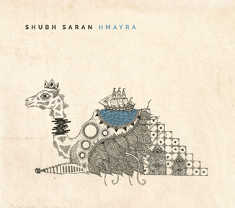The Graham Album Review #1902

Click on CD Cover for Audio Review in streaming mp3 format | |
Shubh Saran: Hmayra
by George Graham
(Art of Life Records As broadcast on WVIA-FM 6/14/2017)

Click on CD Cover for Audio Review in streaming mp3 format | |
Shubh Saran: Hmayra
by George Graham
(Art of Life Records As broadcast on WVIA-FM 6/14/2017)
During the 1970s when both jazz-rock fusion and progressive rock were at their heights, there were some artists who would mix the genres, bringing jazzy instruments like horns and some jazz rhythms to the elaborate electric arrangements of the progressive rockers. Brand X, which featured Phil Collins on drums, and Yes drummer Bill Bruford’ solo projects were examples of that. More recently on this album review series, we featured an recording by saxophonist Bill Evans which was also in the progress-rock-fusion category.
This week we have an impressive new recording by an Indian-born guitarist composer that also spotlights intricate compositions and arrangements with some jazz sensibility and the prominence of horns. It’s by Shubh Saran, and his new release is called Hmarya.
Twenty-five-year-old Shubh Saran has lived a rather peripatetic life. Born in India, he lived in Egypt, Switzerland and Canada, before coming to the US to attend the Berklee College of Music in Boston in 2010. His biography said that he spent a year in college in Toronto at a liberal arts school before he decided to devote himself to his music. In India, he grew up with the popular music there, but at Berklee, was immersed in jazz, which he thoroughly absorbed. While at the music school he began performing with his own groups as as a supporting musician for others, including tours to Bangladesh, Vietnam and India.
In 2014, he released an EP called A Room with a View which was a bit more toward mainstream jazz than the new album. Its title, Hmayra, according to Saran, is from the ancient Syriac language meaning “hostage” but in the sense of a person who was exchanged between kingdoms in order to honor an agreement. Such Hmayra were often given an exalted position in the kingdom they were sent to, but were still hostages and could not go home.
The music on Hmayra is an absorbing and creative mixture of influences, with the Indian sounds rather subtle, more in terms of percussion than the familiar tonalities and instrumentation of the subcontinent. Interestingly, Saran also plays a little banjo. Jazzy saxophones are prominent on almost all the tracks, and the album is rife with the complex interlocking rhythms that can evoke Eastern European folk music. Saran’s role is more the composer and arranger rather than the lead guitarist. In fact, Saran plays relatively few solos, leaving it to the horns and keyboards. The music ranges from angular and edgy sounding to a couple of more melodic pieces.
The band on the album includes keyboardist Cale Hawkins, who goes for more vintage analog instruments and acoustic piano, drummer Angelo Spampinato, bassist Mark Minoogian, saxophonists Jared Yee and Brian Plautz, along with percussionist Joshua Bailey who adds some interesting sonic colors without evoking the expected Indian tabla sound.
Opening is one two short preludes, The Profane which hints at the sonic pastiche on its way. <<>>
That leads into Slip which has Saran and his band in full progressive rock mode, with the Eastern-European-sounding rhythm. <<>> The track contains one of Saran’s relatively few guitar solos on the album. He’s no slouch though. <<>>
Also with the album’s creative progressive-rock fusion blend is the following piece It Was You. It has a bit more of a rock beat. <<>>
Probably the height of the album’s “progressive rockism” comes on the piece called Blank Stare which it might induce in some for its sheer arrangement virtuosity, passing as it does through various phases in various meters. <<>>
This relatively short album’s longest piece is its most mellow sounding, Haze with Saran’s acoustic guitars dominating, and he also plays some banjo in the arrangement. <<>>
Also hinting at Eastern-European rhythms is Tyaga on which the saxes are joined by a trumpet and trombone. It’s another great piece of composing and arranging, with tasteful playing all around. <<>>
The album closes with Ascent which is well-named with its theme based on rising note patterns, and the way the dynamics of the piece builds to a climax at the end. It provides another good dose of the energy of the progressive rock scene.
Hmayra, the new debut full-length album by Indian-born guitarist and composer Shubh Saran is a real standout almost immediately from its start. Its mixture of the elaborate, sometimes edgy compositions of the progressive rock school, along with the harmonic influence and the horn arrangements of jazz and fusion provide great listening for those with a hankering for substantial, multi-faceted electric music. Saran is a first-rate composer and a tasteful guitarist who makes a very impressive showing on this album.
Our grade for audio quality is an unqualified “A.” The mix has good clarity, the drum sound is nice and punchy. And most notably is something that is increasingly rare today, the recording was not compressed heavily in the mastering process. So the ebb and flow of the performance and its dynamics are preserved.
In a recent interview with the Press Trust of India, Shubh Saran said he hoped one day to go back to India and create music for Bollywood films. I’m sure he would do well. But his new recording of electric instrumental music is at the highest level and should provide some wow factor for prog fans.
(c) Copyright 2017 George D. Graham. All rights reserved.
This review may not be copied to another Web site without written permission.
 To Index of Album Reviews | To George Graham's Home Page. | What's New on This Site.
To Index of Album Reviews | To George Graham's Home Page. | What's New on This Site.